Graham Reid | | 5 min read
Fleet Foxes: Sun It Rises
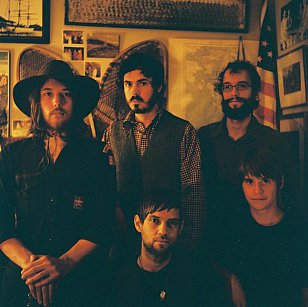
The big music story of 2008 wasn’t Britney back on track, Axl Rose finally delivering the Chinese Democracy album or even Kanye West sidestepping the hip-hop that made his name for an album of songs and techno-blips.
It was how the self-titled and self-funded debut album from a previously unknown band -- which didn’t exist outside a studio a year ago -- topped many critics polls (the Herald, Mojo). It was one of Elsewhere's "best of 2008"albums, the album and the band were nominated as best album and best new act in the Q magazine awards -- and yet it all seemed to arrive out of nowhere.
Yet Fleet Foxes wasn’t another Britband phenomenon the UK press throws up with almost predictable regularity. Nor were they a media-savvy US outfit along the Scissor Sisters/Interpol axis.
The fact Fleet Foxes came from Seattle and were signed to Sub Pop didn’t mean much either: they owed nothing to that city’s grunge history (their singer-songwriter was eight when Nirvana's Kurt Cobain topped himself) and very little to the music of their label mates (least of all Flight of the Conchords).
And they certainly weren’t anyone’s idea of stars for teen-pop magazines or shiny happy video clips: the mostly bearded five-piece looked like intense and somewhat moody folk from a remote mountain.
It was even hard to pick a single off their album which came with a cover image taken from the 16th century painter Pieter Bruegel the Elder.
No, on every level the sudden rise of Fleet Foxes has been the most interesting story of the year. Their success caught everyone by off guard, not the least them.
“We were absolutely surprised,” says keyboardist/guitarist Casey Wescott who still sounds breathless. “We’d finished this record before we were even signed to a label so this band existed in a vacuum -- and you never know how people are going to take things.
“Last year at this time I was sort of homeless and sleeping in a van due to different circumstances. So it’s pretty amazing to see all that has happened this year.
“We’ve been to Europe twice -- three times actually -- including Scandinavia, and three times in the States. It’s been eight months of touring in a year and that’s a lot for us.
“I haven’t really travelled in my life -- I was in bands from 15 but that was just going around the United States a bit -- and this has been a real shock going across the Atlantic to places I have never been.
“I’m not much of a traveller and others in the band had toured even less before al’ this happened,” says Wescott, “but we’re getting the opportunity to play places we wouldn’t normally go.
“But a lot of times we’ll go to a club to set up and be there all day before the show and not even get the time to go out, and its Vienna or some amazing city out there.”
Little more than a year ago Fleet Foxes weren’t seeing much other than the rooms in which they were recording their album -- and they were mostly in their houses or those of friends. The album cover notes, “Phil Ek produced, engineered and mixed, except when we were flailing around at home, recording ourselves poorly for him to clean up later. This happened often.”
Not that the rich sounding album comes off as lo-fi, quite the opposite. It has an almost baroque embellishment as the band’s intricate harmonies weave seamlessly around melodies, and in places there is a hymnal-pop quality.
In many ways their poll-topping is unsurprising because Fleet Foxes are at one level a critics’ band: the album has aural references to the Beach Boys and close-harmony West Coast pop of the Sixties; the Seventies singer-songwriters out of LA; Anglofolk bands such as Lindisfarne, Steeleye Span and (one for the critics) the rather more obscure Amazing Blondel; the quasi-choral prog-rock of the Moody Blues; and the 60s British band the Zombies who have undergone a rediscovery recently with the reissue of their 1968 Odessey and Oracle (sic) album.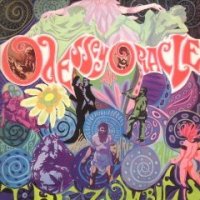
Fleet Foxes is the brainchild of singer-songwriter Robin Peckold and his longtime friend Skyler (Sky) Skjelset who met in junior high school, discovered a mutual passion for folk music, fell in love with Beach Boys harmonies and grew up with their parents’ record collection of Sixties and Seventies popp, folk and folk-rock.
Together -- both from Scandinavian backgrounds and prone to a reclusive spirit -- they began working on songs and over time were joined by Seattle locals Wescott and Christian Wargo who had their own electro-influenced two-piece Crystal Skulls.
“The two bands were separate and I’d know Christian since I was 15,” says Wescott. “I met Robin and Sky through mutual friends. So I joined them about two years ago and Christian joined last year.”
Crystal Skulls continued while the nascent and unnamed Fleet Foxes began recording Pecknold’s songs and Wescott says it wasn’t until drummer Josh Tillman joined six months ago that the band was fully formed.
“The record we finished in November [2007] and we then did an EP [Sun Giant], and then Josh came in. It wasn’t until we started recreating it live that I felt the thing started to gel. When you’re making record you’re just idea-capturing as opposed to thinking ’we’re this unit‘. But now we are.”
And much acclaimed.
Interestingly most of the album was written when Pecknold was in England’s Lake District and a sense of English folk permeates the music and pastoral lyrics. This may account for its immediate success in Britain (it went almost top 10 but only reached 67 on the US charts) however the album is more than merely the sum of influences: it boasts sublime and memorable pop melodies and harmonies, has an autumnal feel and in places suggests a kind of secular religious music. Pecknold’s voice is quietly compelling.
“We were all listening to all kinds of music and a lot of it didn’t come from America. Everybody grew up with the Zombies but Robin turned me on to Steeleye Span and I turned Robin on to [classical composer] Ravel though.
“So we have common musical touchstones but listen diversely.
“Sky and Robin are 23 so pretty much missed music in the Eighties, so we are coming from different experiences. We’re constantly sharing music so there may be common threads.”
And they have survived a gruelling and enjoyable year which might have destroyed a less mature band?
“Well, everybody in this band is really close and we’re good at communicating, and that’s a good step in the maturity direction. But we’re also coming from different places. I’m 27 but a couple of the others folks are younger than me and so we have stratified experiences.
“Sky and Robin are 23, but you’d think they were older maybe.
“But we really love doing this and I think that really comes out --- although we’ve also been not very mature,” he laughs.
“Those have been the fun moments too. It‘s been an insane year.”
This is an expanded version of the interview which appeared in the New Zealand Herald.

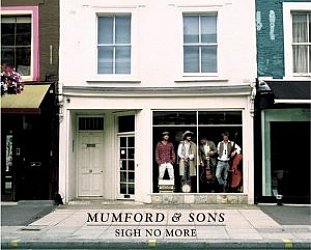
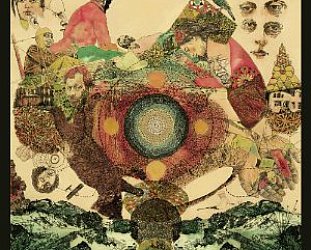
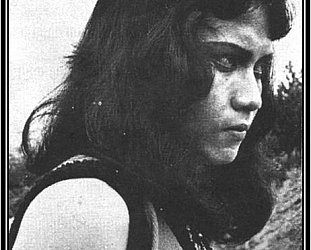

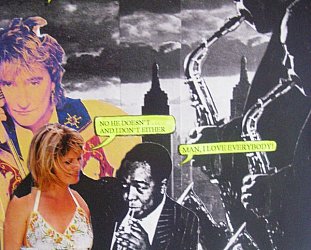

post a comment